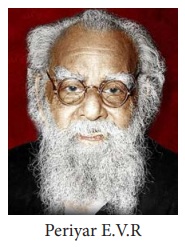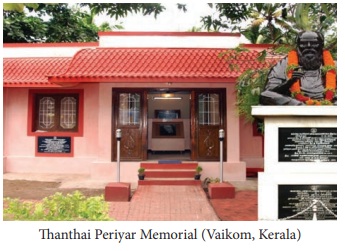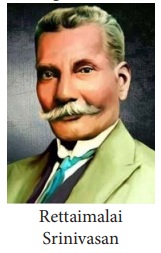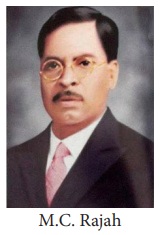Social Transformation in Tamil Nadu - Self-Respect Movement (Suyamariyathai Iyakkam) | 10th Social Science : History : Chapter 10 : Social Transformation in Tamil Nadu
Chapter: 10th Social Science : History : Chapter 10 : Social Transformation in Tamil Nadu
Self-Respect Movement (Suyamariyathai Iyakkam)
Self-Respect Movement (Suyamariyathai Iyakkam)
The
Self-Respect movement advocated a casteless society devoid of rituals and
differences based on birth. The movement declared rationality and self-respect
as the birthright of all human beings and held these as more important than
self-rule. The movement declared illiteracy as a source for women’s
subordination and promoted compulsory elementary education for all.
The
movement demanded women’s emancipation, deplored superstitions, and emphasised
rationality. The movement also advocated self-respect marriage.
The
Self-Respect Movement championed not only the cause of the non-Brahmin Hindus,
but also that of the Muslims. The Self -Respect Movement extolled the lofty
principles of Islam such as equality and brotherhood.
Periyar E.V.R.
Periyar
E.V. Ramasamy (1879–1973) was the founder of the Self-Respect Movement.

He was
the son of a wealthy businessman in Erode, Venkatappa and Chinna Thayammal.
Though possessing little formal education, he engaged in critical discussions
with scholars, who used to be patronised by his devout father. As a young man,
he once ran away from home and spent many months in Varanasi and other
religious centres. The firsthand experience of orthodox Hindu religion led to
his disillusionment with religion. On his return, he took care of his family
business for some years. His selfless public service and forthrightness made
him a popular personality. He held different official positions of Erode that
included the Chairmanship of Municipal Council (1918– 1919).
As president
of the Tamil Nadu Congress Committee, Periyar proposed a resolution regarding
the rights of “Untouchables” to temple entry. In the name of “caste dharma” the
“lower caste” people were denied access to the temples and the streets
surrounding the temple. In Vaikom (a town in the then Princely State of
Travancore and in present day Kerala), people protested against this practice.
In the initial stages George Joseph of Madurai played big role. After the local
leaders were arrested Periyar led the movement and was imprisoned. People
hailed him as Vaikom Virar (Hero of
Vaikom). In the meantime, he was disturbed by the caste-based discrimination in
the dining hall at the Cheranmadevi Gurukulam
(school), which was run by V.V.Subramaniam (a Congress leader) with the
financial support of the Tamil Nadu Congress Committee. Periyar was
disappointed when, despite his objections and protests against this
discrimination, the Congress continued to support the iniquitous practice in
the Gurukulam.

Periyar
started the Self-Respect movement in 1925. Periyar understood the relevance of
mass communication in spreading rationalist thought. He started a number of
newspapers and journals such as Kudi
Arasu (Democracy) (1925), Revolt
(), Puratchi (Revolution) (1933), Paguththarivu (Rationalism) (1934), and Viduthalai (Liberation) (1935). Kudi Arasu was the official newspaper of
the Self-Respect Movement. Usually, Periyar wrote a column and expressed his
opinion on social issues in each of its issues. He frequently wrote columns
under the pseudonym of Chitraputtiran.
Periyar
had a close relationship with Singaravelar who is considered the first
communist of south India and a pioneer of Buddhism. In 1936, Periyar got Dr. B.
R. Ambedkar’s Annihilation of Caste translated into Tamil
immediately after it was written. He
also supported Ambedkar’s demand for separate electorates for scheduled castes.
In 1937,
in opposition to the Rajaji’s government’s move to introduce compulsory Hindi
in schools, he launched a popular movement to oppose it. The anti-Hindi
agitation (1937–39) had a big impact on Tamilnadu’s politics. Periyar was
imprisoned for his role in the movement. When he was still in jail, Periyar was
elected the president of the Justice Party. Thereafter the Justice Party merged
with the Self-Respect Movement. It was rechristened as Dravidar Kazhagam (DK)
in 1944.
Rajaji,
the Chief Minister of Madras State (1952–54), introduced a vocational education
programme that encouraged imparting school children with training in tune with
their father’s occupation. Periyar criticised it as Kula Kalvi Thittam
(caste-based education scheme) and opposed it tooth and nail. His campaigns
against it led to the resignation of Rajaji. K. Kamaraj became Chief Minister of
the Madras State. Periyar died at the age of ninety four (1973). His mortal
remains were buried at Periyar Thidal, Madras.
Periyar, a Feminist
Periyar
was critical of patriarchy. He condemned child-marriage and the devadasi system
(institution of temple girls). Right from 1929, when the Self-respect
Conferences began to voice its concern over the plight of women, Periyar had
been emphasising women’s right to divorce and property. Periyar objected to
terms like “giving in marriage”. This, he said, treats woman as a thing. He
wants it substituted by “valkaithunai,”(companion)
a word for marriage taken from the Tirukkural. Peiyar’s most important work on
this subject is Why the Woman is Enslaved?
Periyar
believed that property rights for women would provide them a social status and
protection.
In 1989,
Government of Tamil Nadu fulfilled the dream of radical reformers by the
introduction of the Hindu Succession Tamil Nadu Amendment Act of 1989, which
ensured the equal rights to ancestral property for women in inheritance. This
Act became a trendsetter and led to similar legislation at the national level.
Rettaimalai Srinivasan
Rettaimalai
Srinivasan (1859–1945), was born in 1859 at Kanchipuram. He fought for social justice,
equality and civil rights of the marginalised in the caste order. He was honoured
with such titles as Rao Sahib (1926), Rao Bahadur (1930) and Divan Bahadur (1936)
for his selfless social services. His autobiography, Jeeviya Saritha Surukkam (A Brief
Autobiography), published in 1939, is
one of the earliest autobiographies.

Rettaimalai
Srinivasan who had experienced the horrors of untouchability worked for the
progress of the deprived castes. He founded the Adi Dravida Mahajana Sabha in
1893. He served as president of the Scheduled Castes’ Federation and the Madras
Provincial Depressed Classes’ Federation.
A close
associate of Dr B.R. Ambedkar, he participated in the first and second Round
Table Conferences held in London (1930 and 1931) and voiced the opinions of the
marginalised sections of the society. He was a signatory to the Poona Pact of
1932.
M.C. Rajah
Mylai
Chinnathambi Raja (1883–1943), popularly known as M.C. Rajah, was one of the
prominent leaders from the “depressed class”. Rajah started his career as a
teacher and wrote different textbooks for schools and colleges. He was one of
the founding members of the South Indian Liberal Federation (Justice Party). He
became the first elected Legislative Council Member (1920–26) from the
depressed classes in Madras province. He functioned as the Deputy Leader of
Justice Party in the Madras Legislative Council.

In 1928,
he founded the All India Depressed Classes Association and was its long time
leader.
Related Topics